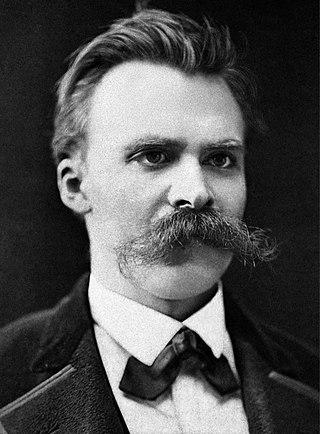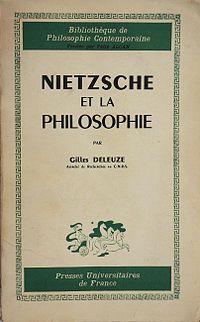
Friedrich Wilhelm Nietzsche was a German philosopher. He began his career as a classical philologist before turning to philosophy. He became the youngest person to hold the Chair of Classical Philology at the University of Basel in 1869 at the age of 24, but resigned in 1879 due to health problems that plagued him most of his life; he completed much of his core writing in the following decade. In 1889, at age 44, he suffered a collapse and afterward a complete loss of his mental faculties, with paralysis and probably vascular dementia. He lived his remaining years in the care of his mother until her death in 1897 and then with his sister Elisabeth Förster-Nietzsche. Nietzsche died in 1900, after experiencing pneumonia and multiple strokes.
In psychoanalysis and other psychological theories, the unconscious mind is the part of the psyche that is not available to introspection. Although these processes exist beneath the surface of conscious awareness, they are thought to exert an effect on conscious thought processes and behavior. Empirical evidence suggests that unconscious phenomena include repressed feelings and desires, memories, automatic skills, subliminal perceptions, and automatic reactions. The term was coined by the 18th-century German Romantic philosopher Friedrich Schelling and later introduced into English by the poet and essayist Samuel Taylor Coleridge.
Monroe Curtis Beardsley was an American philosopher of art.
Destiny, sometimes also called fate, is a predetermined course of events. It may be conceived as a predetermined future, whether in general or of an individual.
Michael Hague is an American illustrator, primarily of children's fantasy books.

Arthur Schopenhauer's aesthetics result from his philosophical doctrine of the primacy of the metaphysical Will as the Kantian thing-in-itself, the ground of life and all being. In his chief work, The World as Will and Representation, Schopenhauer thought that if consciousness or attention is fully engrossed, absorbed, or occupied with the world as painless representations or images, then there is no consciousness of the world as painful willing. Aesthetic contemplation of a work of art provides just such a state—a temporary liberation from the suffering that results from enslavement to the will [need, craving, urge, striving] by becoming a will-less spectator of "the world as representation" [mental image or idea]. Art, according to Schopenhauer, also provides essential knowledge of the world's objects in a way that is more profound than science or everyday experience.
Philosophy of sex is an aspect of applied philosophy involved with the study of sex and love. It includes both ethics of phenomena such as prostitution, rape, sexual harassment, sexual identity, the age of consent, homosexuality, and conceptual analysis of more universal questions such as "what is sex?" It also includes matters of sexuality and sexual identity and the ontological status of gender. Leading contemporary philosophers of sex include Alan Soble, Judith Butler, and Raja Halwani.

Robert C. Solomon was a philosopher and business ethicist, notable author, and "Distinguished Teaching Professor of Business and Philosophy" at the University of Texas at Austin, where he held a named chair and taught for more than 30 years, authoring The Passions: Emotions and the Meaning of Life (1976) and more than 45 other books and editions. Critical of the narrow focus of Anglo-American analytic philosophy, which he thought denied human nature and abdicated the important questions of life, he instead wrote analytically in response to the continental discourses of phenomenology and existentialism, on sex and love, on business ethics, and on other topics to which he brought an Aristotelian perspective on virtue ethics. He also wrote A Short History of Philosophy and others with his wife, Professor Kathleen Higgins.

Aesthetics of music is a branch of philosophy that deals with the nature of art, beauty and taste in music, and with the creation or appreciation of beauty in music. In the pre-modern tradition, the aesthetics of music or musical aesthetics explored the mathematical and cosmological dimensions of rhythmic and harmonic organization. In the eighteenth century, focus shifted to the experience of hearing music, and thus to questions about its beauty and human enjoyment of music. The origin of this philosophic shift is sometimes attributed to Baumgarten in the 18th century, followed by Kant.
Christopher Janaway is a philosopher and author. He earned degrees from the University of Oxford. Before moving to Southampton in 2005, Janaway taught at the University of Sydney and Birkbeck, University of London. His recent research has been on Arthur Schopenhauer, Friedrich Nietzsche and aesthetics. His 2007 book Beyond Selflessness: Reading Nietzsche's Genealogy focuses on a critical examination of Nietzsche's On the Genealogy of Morals. Janaway currently lectures at the University of Southampton, which in the past has included a module focusing on Nietzsche's Genealogy. That module is now convened by Janaway's colleague, Aaron Ridley.
Janet McCracken is the Chair of Classical Studies and Professor of Philosophy at Lake Forest College. She specializes in aesthetics.
Philosophy of music is the study of "fundamental questions about the nature and value of music and our experience of it". The philosophical study of music has many connections with philosophical questions in metaphysics and aesthetics. The expression was born in the 19th century and has been used especially as the name of a discipline since the 1980s.
Espen Hammer is Professor of Philosophy at Temple University. Focusing on modern European thought from Kant and Hegel to Adorno and Heidegger, Hammer’s research includes critical theory, Wittgenstein and ordinary language philosophy, phenomenology, German idealism, social and political theory, and aesthetics. He has also written widely on the philosophy of literature and taken a special interest in the question of temporality.
David Edward Cooper is Emeritus Professor of Philosophy at Durham University.

Nietzsche and Philosophy is a 1962 book about Friedrich Nietzsche by the philosopher Gilles Deleuze, in which the author treats Nietzsche as a systematically coherent philosopher, discussing concepts such as the will to power and the eternal return. Nietzsche and Philosophy is a celebrated and influential work. Its publication has been seen as a significant turning-point in French philosophy, which had previously given little consideration to Nietzsche as a serious philosopher.
Ivan Soll is an American philosopher who is a Professor Emeritus in the Department of Philosophy at the University of Wisconsin–Madison in the United States. He taught at UW from 1965 until his retirement in May 2011. His teaching and research focused on the philosophy of Friedrich Nietzsche, German philosophy in general, existentialism, aesthetics, and various figures of continental philosophy.
Clancy Martin is a Canadian philosopher, novelist, and essayist. His interests focus on 19th century philosophy, existentialism, moral psychology, philosophy and literature, ethics & behavioral health, applied and professional ethics and philosophy of mind.
Berys Gaut is an author and Professor of Philosophy at the University of St Andrews. He writes on aesthetics, creativity, philosophy of film, and ethics. He was president of the British Society of Aesthetics until 2018.
Daniel Came is a British philosopher. He is Senior Lecturer and Programme Leader in philosophy at the University of Lincoln. He was previously Lecturer in Philosophy, at the University of Hull, College Lecturer in Philosophy at St Hugh's College, Oxford, and Lecturer in Philosophy at Birkbeck College, University of London. His research focuses on post-Kantian European philosophy, especially the work of Arthur Schopenhauer and Friedrich Nietzsche, as well as ethics, aesthetics and the philosophy of religion. Came is also known for engaging in public debates about religion and the existence of God with figures such as William Lane Craig and Richard Dawkins.




